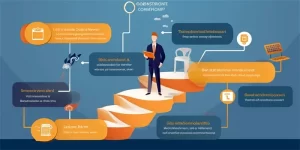In today’s rapidly evolving world, artificial intelligence (AI) has emerged as a powerful force that both empowers and threatens job market stability. While AI technologies enhance productivity, efficiency, and innovation in various industries, they also pose significant challenges and concerns regarding unemployment and inequality. This article delves into the paradoxical nature of AI, exploring how it simultaneously empowers and threatens job market stability from multiple perspectives.

1. Automation and Job Displacement
AI, particularly through automation, has the potential to replace certain job roles, leading to concerns about widespread job displacement. As AI systems become increasingly capable of performing routine tasks and repetitive jobs, workers in manufacturing, customer service, and transportation sectors may bear the brunt of the displacement. Policymakers must find strategies to navigate this transition and ensure affected individuals can reskill and adapt to emerging job opportunities.
2. Skill Enhancement and Job Creation
On the other hand, AI presents immense opportunities for skill enhancement and job creation. As routine tasks are automated, workers can focus on higher-value activities that require creativity, critical thinking, and emotional intelligence. AI can empower individuals to upskill and transition into new roles that leverage uniquely human capabilities. This can lead to the creation of jobs that are currently unimaginable, particularly in areas such as data analysis, cybersecurity, and AI-guided decision-making.
3. Economic Growth and Market Expansion
AI has the potential to fuel economic growth and open new avenues for market expansion. By harnessing data-driven insights and predictive analytics, businesses can optimize their operations, improve customer experiences, and develop innovative products and services. This can drive increased demand, resulting in the creation of new jobs across various sectors. However, ensuring equitable distribution of the benefits arising from AI-driven economic growth is crucial to maintaining job market stability.
4. Skill Demand Shifts and Lifelong Learning
The integration of AI in the job market brings forth a shift in skill demand. While certain skills might become less relevant, new skills such as data analysis, machine learning, and AI programming will be in high demand. The need for individuals to engage in lifelong learning becomes imperative to remain competitive. Governments, educational institutions, and businesses need to collaborate to offer accessible and affordable upskilling and reskilling opportunities to help workers adapt to the changing demands of the job market.
5. Ethical Considerations and Human Oversight
As AI systems become increasingly autonomous, ethical concerns arise regarding their decision-making capabilities. It is crucial to strike a balance between leveraging AI’s potential and maintaining human oversight to ensure fairness, transparency, and accountability. Preventing algorithmic biases, protecting privacy, and considering the ethical implications of AI deployment are vital to mitigate any negative impacts on job market stability.
6. Increasing Income Inequality
While AI has the potential to increase overall productivity, wealth, and efficiency, there is a concern that it may exacerbate income inequality. The technological advancements driven by AI could concentrate wealth and power in the hands of a few, leading to social disparity. To address this challenge, policymakers need to design inclusive policies that ensure fair redistribution of the benefits derived from AI’s impact on the job market.
7. Collaboration Between Humans and AI
Rather than viewing AI as a threat, it is essential to foster collaboration between humans and AI technologies. By embracing human-AI symbiosis, individuals can leverage AI as a tool to augment their capabilities, making them more efficient and productive. This partnership has the potential to transform industries, unleash creativity, and lead to the development of innovative solutions to complex problems.
Frequently Asked Questions:
1. Will AI replace all jobs?
No, AI is unlikely to replace all jobs. While it may automate certain routine tasks, there will continue to be a need for uniquely human skills, creativity, and emotional intelligence that AI cannot replicate. Job roles may evolve, requiring a combination of human-AI collaboration.
2. What industries are most vulnerable to AI-driven job displacement?
Industries such as manufacturing, customer service, transportation, and data entry are most vulnerable to AI-driven job displacement. However, new industries and job opportunities are expected to emerge as AI technologies advance further.
3. How can workers prepare for the impact of AI on the job market?
Workers can prepare for the impact of AI by continuously upskilling and reskilling themselves. Acquiring skills in areas like data analysis, AI programming, and machine learning can enhance employability and adaptability to changing job market demands.
References:
1. John, G. (2020). Artificial intelligence and the end of work. Harvard Business Review.
2. World Economic Forum. (2018). The Future of Jobs Report 2018.
3. Ng, A. (2017). The state of artificial intelligence. Foreign Affairs.








